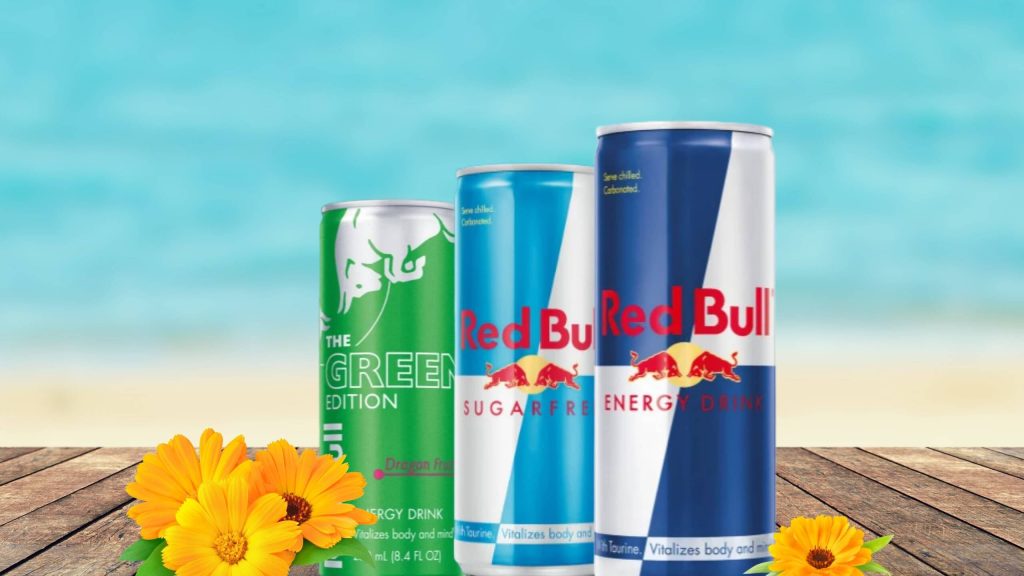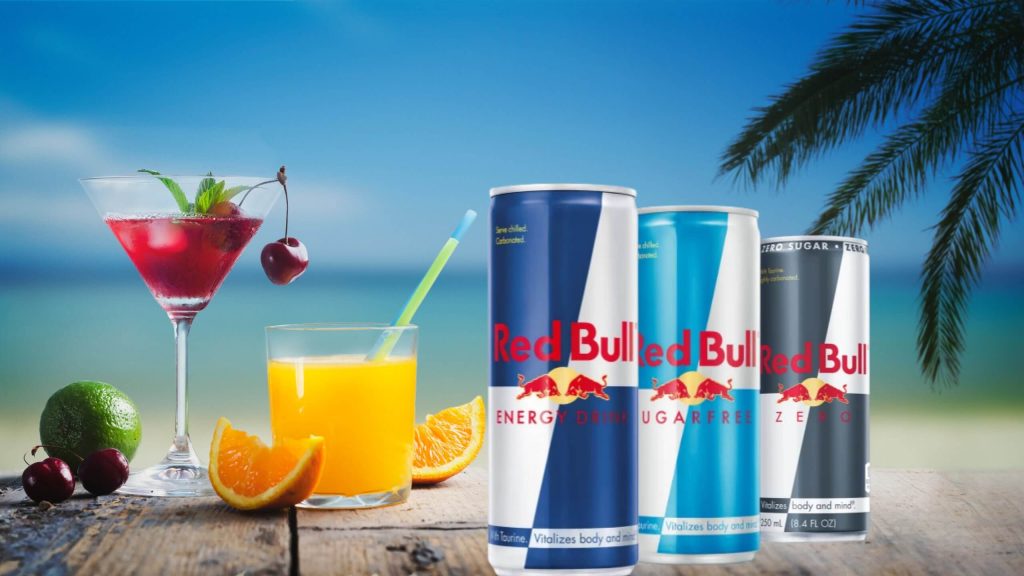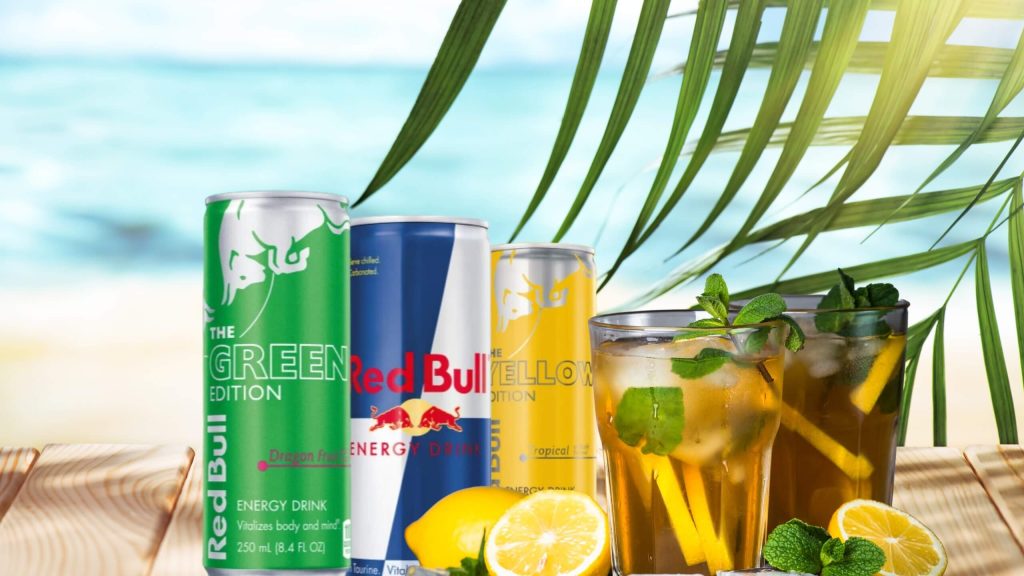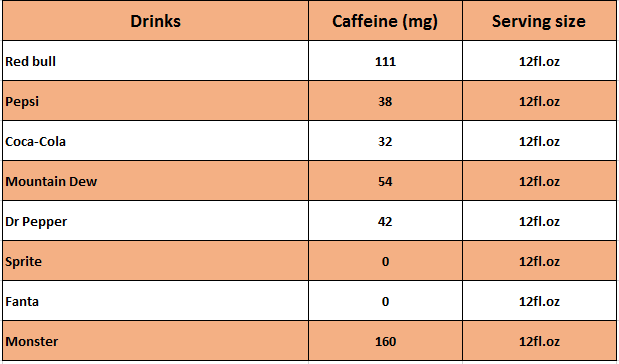Contents
- 1 How Much Caffeine In Red Bull? Discover Now!
- 1.1 What Is Red Bull?
- 1.2 History of Red Bull Energy Drink:
- 1.3 Red Bull Ingredients:
- 1.4 Variations of Red Bull Energy Drink:
- 1.5 Difference Between Regular Red Bull and Red Bull Sugarfree?
- 1.6 Difference Between Regular Red Bull and Red Bull Editions?
- 1.7 Does Red Bull Have Caffeine?
- 1.8 How Much Caffeine In Red Bull?
- 1.9 Caffeine Levels of Red Bull Compare to Coffee?
- 1.10 Caffeine Levels of Red Bull Compared to Other Energy Drinks?
- 1.11 Benefits of Consuming Red Bull?
- 1.12 Side effects of Drinking too Much Red Bull:
- 1.13 Tips For Reducing Caffeine Intake of Red Bull:
- 1.14 FAQs: How Much Caffeine In Red Bull?
- 1.14.1 Q: Is Red Bull safe to consume?
- 1.14.2 Q: How much caffeine in 12 oz Red Bull?
- 1.14.3 Q: How much caffeine in 16 oz Red Bull?
- 1.14.4 Q: How much caffeine in red bull sugar free?
- 1.14.5 Q: How much caffeine is in a 20 oz Red Bull?
- 1.14.6 Q: Is Red Bull suitable for children?
- 1.14.7 Q: Is Red Bull bad for your health?
- 1.14.8 Q: Does Red Bull contain sugar?
- 1.14.9 Q: What is Red Bull’s recommended consumption limit?
- 1.14.10 Q: Does Red Bull help with concentration?
- 1.14.11 Q: Does Red Bull help with weight loss?
- 1.14.12 Q: Does Red Bull contain alcohol?
- 1.14.13 Q: Does Red Bull contain vitamins?
- 1.14.14 Q: Is Red Bull vegan?
- 1.14.15 Q: Where can I buy Red Bull?
- 1.14.16 Q: Does Red Bull have any side effects?
- 1.14.17 Q: Is Red Bull safe to drink during pregnancy?
- 1.14.18 Q: Does Red Bull contain preservatives?
- 1.14.19 Q: Does Red Bull contain artificial sweeteners?
- 1.14.20 Q: Is Red Bull suitable for diabetics?
- 1.14.21 Q: Is there a calorie-free version of Red Bull?
- 1.15 Conclusion: How Much Caffeine In Red Bull?
- 1.16 Related posts:
- 2 Top 15 Keto Snacks for Christmas You'll Absolutely Love
- 3 How Long Does Espresso Last? Expert Storage Tips
- 4 How to Make Coffee Yogurt: A Comprehensive Guide
- 5 How Much Caffeine in Coffee? Your Ultimate Guide
How Much Caffeine In Red Bull? Discover Now!
It’s no secret that energy drinks are popular with people of all ages – but how much caffeine is actually in them? Knowing the amount of caffeine in an energy drink can help inform your decision before you purchase and determine if it’s right for you.
In this blog post, we’ll explore exactly how much caffeine is in Red Bull and provide some helpful tips to keep your consumption of energizing beverages in check. Read on to learn more!
What Is Red Bull?

Red Bull is a well-known energy drink that has become quite popular across the globe. Packed with caffeine and other energizing ingredients, this beverage promises to give you the boost you need to power through your day.
While it’s not meant to replace a healthy, balanced diet, many people turn to Red Bull to help them fight fatigue and stay alert in various situations, whether trying to push through a long day at work or staying awake during a late-night study session.
Red Bull has become an iconic brand recognized worldwide with its distinctive logo and bright red and blue colors. Despite some controversy surrounding its ingredients and potential health effects, this drink remains a top choice for many looking to energize both mind and body.
History of Red Bull Energy Drink:
Red Bull was first introduced in 1987 by Austrian entrepreneur Dietrich Mateschitz. Inspired by a popular Thai energy drink called Krating Daeng, Mateschitz created an international version with a few tweaks. Thus, the Red Bull we know today was born.
In its early days, Red Bull was marketed as a “performance-enhancing” drink and quickly rose to popularity in many countries, particularly among athletes. Today, Red Bull is one of the most popular energy drinks in the world, with an estimated 7 billion cans consumed annually!
Red Bull Ingredients:
Red Bull contains several ingredients: caffeine, taurine, B-group vitamins, sucrose, and glucose. Caffeine is the ingredient that is most associated with energy drinks and is one of the main components of Red Bull.
Taurine is an amino acid that can help increase alertness and combat fatigue, while B-group vitamins provide energy support and help the body metabolize carbohydrates, proteins, and fats.
Sucrose and glucose are simple sugars that can also help give an energy boost. Red Bull also contains a proprietary “energy blend,” which has made Red Bull become the most popular energy drink nowadays!
Variations of Red Bull Energy Drink:

Red Bull has various flavors: original, sugar-free, total zero, and tropical. Each flavor has different levels of calories and ingredients.
The company also offers specialty drinks like Red Bull Energy Shot and Red Bull Editions. These variations of the original drink are designed to give a quick energy boost in single-serve sizes.
With a commitment to quality and innovation, Red Bull has exceeded expectations and become a leader in the energy drink industry.
Difference Between Regular Red Bull and Red Bull Sugarfree?
The significant difference between regular Red Bull and sugar-free Red Bull is the calories in each. Regular Red Bull contains 110 calories per 8.4 fl oz (250 ml) can, while sugar-free only has 10 calories.
The sugar-free option also has fewer carbohydrates than the regular version. The main difference in ingredients is the addition of aspartame and acesulfame K in Red Bull Sugarfree, which are artificial sweeteners used to replace sugar.
Difference Between Regular Red Bull and Red Bull Editions?
Red Bull Editions are variations of the original Red Bull formula, designed to offer different flavors and effects.
Each edition has unique flavor options that cater to different preferences. Regular Red Bull includes the iconic taste, which has been popular since the brand launched. The Red Bull Editions come in various flavors, such as tropical, cranberry, and blueberry…These new flavors offer customers different options to choose from.
All editions still contain the same caffeine content and other essential energy-boosting ingredients. The choice between Regular Red Bull and Red Bull Editions primarily concerns personal taste. While the brand’s signature flavor is still popular, adventurous individuals might appreciate exploring new product variations.
Does Red Bull Have Caffeine?
Red Bull, the popular energy drink, is known for its stimulating properties that boost energy levels. Red Bull contains a blend of ingredients, including caffeine, to achieve this effect.
Caffeine is a central nervous system stimulant commonly found in coffee, tea, and other drinks. It can increase alertness, improve mood, and reduce fatigue.
The exact amount of caffeine in Red Bull may vary slightly depending on the formulation and country of origin. Despite its caffeine content, Red Bull is popular among consumers looking for a quick energy boost.
How Much Caffeine In Red Bull?

According to the manufacturers, one 8.4 oz can of Red Bull contains 80mg of caffeine, about the same as a cup of coffee. But it’s important to remember that caffeine affects everyone differently, and consuming too much can lead to negative side effects, including jitters, anxiety, and even heart palpitations.
It’s always recommended to consume energy drinks in moderation and be aware of how much caffeine you consume throughout the day. It’s important to read the label carefully to know how much caffeine you consume.
Caffeine Levels of Red Bull Compare to Coffee?
When comparing the caffeine levels of Red Bull and coffee, it’s important to note that it can vary greatly depending on the serving size and method of preparation. On average, an 8 oz. cup of coffee contains between 80-100 mg of caffeine, while an 8.4 oz can of Red Bull contains 80 mg of caffeine.
While the caffeine levels are similar, it’s important to consider the other ingredients in these beverages. Red Bull contains additional ingredients such as taurine and B vitamins that can enhance energy and athletic performance.
However, the effects of the two beverages may be different for some. Coffee’s stimulating effects are usually felt within 15 minutes and can last up to six hours, while the effects of Red Bull may be felt within five to 10 minutes and can last for several hours.
In terms of energy boost, both coffee and Red Bull are considered a good choice for a quick pick-me-up. However, if you’re looking for an extended period of alertness and focus, other beverages, such as matcha or green tea, may be a better option.
Caffeine Levels of Red Bull Compared to Other Energy Drinks?
When comparing the caffeine levels of Red Bull with other energy drinks, it’s important to note that they can vary significantly. Generally speaking, the caffeine content in energy drinks ranges from 50-200 mg per serving.
Red Bull is on the lower end of this range, containing 80mg of caffeine per 8.4 fl oz (250ml) can. This is comparable to the caffeine content in a cup of coffee. However, other energy drinks, such as Monster Energy, may contain significantly more caffeine than Red Bull, which contains 160mg per can.
Here is the chart of caffeine levels in some energy drinks:

Benefits of Consuming Red Bull?
Besides its refreshing taste, Red Bull contains several ingredients that provide various health benefits, such as taurine, caffeine, and B-group vitamins. Here are some benefits when you drink Red Bull:
Increased Energy Levels
Red Bull is an energy drink that contains caffeine, taurine, and other ingredients that can help to increase energy levels. Caffeine is a stimulant that can help improve alertness and focus, while taurine is an amino acid linked to improved physical performance and mental alertness. Red Bull also contains B vitamins, which can help the body convert food into energy more efficiently.
Improved Cognitive Performance
Studies have shown that consuming Red Bull can improve cognitive performance. One study found that consuming Red Bull before completing a task improved reaction time, accuracy, and short-term memory recall compared to those who did not consume the drink. This suggests that Red Bull may benefit those who need to stay focused and alert for long periods.
Improved Physical Performance
Red Bull has also been shown to improve physical performance in athletes. Studies have found that consuming Red Bull before exercise can increase endurance and strength during workouts and faster recovery times after exercise. This suggests that Red Bull may benefit athletes looking to get an edge on their competition or improve their overall physical performance.
Reduced Stress Levels
Red Bull has also been found to reduce stress levels in individuals who consume it regularly. Studies have found that regular drink consumption can improve moods and lower cortisol levels, a stress-related hormone.
This suggests that Red Bull may benefit those looking to reduce their stress levels or improve their overall well-being.
Increased Hydration
Red Bull contains electrolytes important for maintaining proper hydration levels in the body. Electrolytes are minerals such as sodium and potassium, which help regulate fluid balance and ensure cells function correctly.
Consuming Red Bull helps maintain proper hydration levels, which is important for overall health and well-being.
Side effects of Drinking too Much Red Bull:
Although Red Bull is generally considered safe for moderation, consuming too much can lead to negative side effects. These include jitters, anxiety, restlessness, insomnia, and heart palpitations.
Read the label carefully to know how much caffeine you’re consuming, and be aware of how much caffeine you consume throughout the day. You should also avoid consuming energy drinks if you are pregnant or have pre-existing medical conditions.
Just consume energy drinks in moderation and ensure you get enough sleep and stay hydrated. If you experience any of the side effects mentioned above, it’s best to stop drinking Red Bull and consult a doctor.
Tips For Reducing Caffeine Intake of Red Bull:
If you often find yourself leaning on Red Bull for a quick energy fix, fret not! You can take some simple steps to reduce caffeine intake and keep your energy levels up. Let’s dive in!
First, you can start by grabbing a smaller can of Red Bull. Instead of reaching for the 8.4 fl oz (250ml) can, go for the 4.2 fl oz (125ml) can. Reducing your can size will cut your caffeine intake in half and still get that much-needed energy boost.
Here’s a fun twist: Mix Red Bull with beverages like water or juice. This nifty trick helps dilute the caffeine content while giving you some energizing benefits. Talk about a win-win!
Remember the magic combo: a wholesome diet and quality sleep. Nourishing your body with nutritious foods and getting sufficient rest can do wonders for maintaining energy levels naturally. Plus, it means less reliance on caffeine or other stimulants.
Remember, Red Bull can be a handy energy tool on those extra demanding days. Don’t let it replace good-for-you habits like eating well and getting proper shut-eye. Keep an eye on your caffeine consumption throughout the day, and with moderation, you can relish the perks of Red Bull without any drawbacks.
You may like to read:
- Does Arizona Green Tea Have Caffeine?
- Does Chai Tea Have Caffeine?
- How Much Caffeine Is In A Pepsi
- Does Fresca have Caffeine?
- Does Powerade Have Caffeine?
FAQs: How Much Caffeine In Red Bull?
Q: Is Red Bull safe to consume?
A: Generally speaking, yes. Red Bull is generally considered safe to consume in moderation. However, consuming too much can lead to negative side effects such as jitters, anxiety, and restlessness.
Q: How much caffeine in 12 oz Red Bull?
A: 12 oz of Red Bull contains 111 mg of caffeine. This is less than the average cup of coffee. It is still enough caffeine to provide a noticeable boost of energy and focus.
Q: How much caffeine in 16 oz Red Bull?
A: 16 oz of Red Bull contains 146 mg of caffeine. This amount is higher than the average cup of coffee, and it has been found to boost energy levels and alertness. It can be a great way to get extra energy during long days or when trying to stay focused on challenging tasks.
Q: How much caffeine in red bull sugar free?
A: Red Bull Sugarfree contains 80 mg of caffeine per 8.4 fl. oz can.
Q: How much caffeine is in a 20 oz Red Bull?
A: 20 oz of Red Bull contains 171 mg of caffeine. This is less than some other popular energy drink brands. It still provides a significant dose of caffeine for those looking for a pick-me-up.
Q: Is Red Bull suitable for children?
A: Red Bull is not recommended for children. The high caffeine content of the product may have negative health effects on kids, including insomnia, nervousness, and stomach upset.
Furthermore, research has indicated that energy drinks can be addictive and should not be consumed in large amounts by children or adolescents. It’s best to stick with healthier options like water or juice when providing drinks to kids.
Q: Is Red Bull bad for your health?
A: In moderation, Red Bull can be a safe and effective way to increase energy and focus. Too much caffeine, however, can negatively affect the body, such as headaches, increased heart rate, and dehydration. As with any product that contains caffeine, it’s important to consume it responsibly and in moderation. Additionally, people should avoid mixing Red Bull with alcohol or other stimulants.
Q: Does Red Bull contain sugar?
A: Each 8.4 fl oz can of regular Red Bull has 27 grams of sugar. There is no sugar in the Sugar-Free version. As a result, it might be a fantastic option for people who want an energy boost without adding sugar.
Q: What is Red Bull’s recommended consumption limit?
A: The World Health Organization recommends a maximum daily intake of 400 mg of caffeine, which equates to about 4 cans of Red Bull per day.
Q: Does Red Bull help with concentration?
A: Red Bull can help to increase concentration and focus due to its high caffeine content. Studies have shown that caffeine can improve alertness, reaction time, memory, and overall cognitive performance.
Q: Does Red Bull help with weight loss?
A: While Red Bull may have some potential to aid in weight loss, this should not be the primary motivation for drinking it. The high sugar content of regular Red Bull can contribute to unwanted fat gain. At the same time, artificial sweeteners found in Red Bull Sugar-Free can increase cravings and lead to higher calorie intake.
Q: Does Red Bull contain alcohol?
A: No, Red Bull does not contain any alcohol. It is made with caffeine, taurine, vitamins, and sugar or sugar substitutes.
Q: Does Red Bull contain vitamins?
A: Yes. Red Bull contains B-Group vitamins, including niacin (B3), pantothenic acid (B5), and B6. The purpose of these vitamins is to contribute to the reduction of tiredness and fatigue, as well as improve normal energy-yielding metabolism.
Q: Is Red Bull vegan?
A: Yes, Red Bull is suitable for vegans, as it does not contain any animal products or by-products.
Q: Where can I buy Red Bull?
A: Red Bull is widely available worldwide, with cans and bottles sold in convenience stores, supermarkets, gas stations, and other retailers. It can also be purchased through official Red Bull websites or third-party sites like Amazon.
Q: Does Red Bull have any side effects?
A: While consuming Red Bull in moderation is generally safe, some people may experience negative side effects such as headaches, insomnia, nervousness, and stomach upset.
Q: Is Red Bull safe to drink during pregnancy?
A: While there is no definitive answer as to whether or not it is safe for pregnant women to consume Red Bull, most health experts advise against it due to the high levels of caffeine in the beverage.
Q: Does Red Bull contain preservatives?
A: Yes, Red Bull contains preservatives such as potassium sorbate and sodium benzoate. These preservatives help extend the product’s shelf life by preventing the growth of bacteria and fungi.
Q: Does Red Bull contain artificial sweeteners?
A: Yes, Red Bull Sugar-Free contains aspartame and acesulfame K as artificial sweeteners. These low-calorie sugar substitutes help give the beverage its signature sweetness without adding additional calories or carbohydrates.
Q: Is Red Bull suitable for diabetics?
A: While regular Red Bull is not recommended for people with diabetes, as it contains large amounts of sugar, the Sugar-Free variant can be a suitable alternative. The sugar-free version contains artificial sweeteners instead of sugar, which makes it much lower in calories and carbohydrates than its regular counterpart.
Q: Is there a calorie-free version of Red Bull?
A: Red Bull Sugar-Free is a lower-calorie alternative to regular Red Bull, just 10 calories per 8.4 oz. This version can be great for those seeking an energy boost without additional calories or carbohydrates.
Conclusion: How Much Caffeine In Red Bull?
While Red Bull has been around for many years, being aware of the amount of caffeine in this particular energy drink is essential. Understanding the impact of as little as one can of an energy drink on your body can go a long way in helping you stay healthy.
If you drink Red Bull or are considering trying it out, get informed and ensure you know the potential effects.
Having a clear understanding of how much caffeine is in Red Bull, including other ingredients such as taurine, and seeing the differences between each serving size can help you make an informed decision when selecting a caffeinated beverage that’s right for you.
Be sure to share this post with your friends and family so they, too, can become informed about the caffeine in Red Bull cans!
Sources: https://www.redbull.com/
Related posts:

Hello, my name is Mary. I’m a passionate food and drink enthusiast, sharing flavorful recipes, creative drinks, and culinary inspiration from around the world. With a love for exploring new tastes and traditions, I bring a mix of easy-to-follow guides and expert tips to make every meal an adventure. Follow along for delicious discoveries and a toast to positive living!




